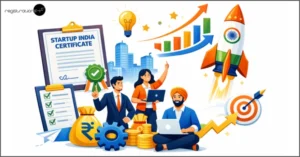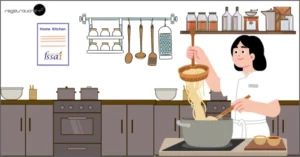What is FMCG? FMCG Products List, and Industry Overview

Fast-Moving Consumer Goods (FMCG) are products sold rapidly at relatively low cost, including essentials such as packaged food, beverages, personal care, and household items. The FMCG industry in 2025 is dynamic, as it is driven by innovation, sustainability, and evolving consumer preferences.
What is FMCG?
The full form of FMCG is “Fast-Moving Consumer Goods,” referring to products that are sold quickly, are typically inexpensive, and have a short shelf life. These goods are found in nearly every household. Although profit margins per item are low, the high sales volumes make the sector highly profitable.
Key Features of FMCG
- High turnover rate due to frequent purchases.
- Affordable pricing that encourages mass consumption.
- Low profit margins per unit, but high overall volumes lead to substantial profitability.
- Short shelf life, either because of perishability (food) or fast consumption cycles (toiletries, cleaning supplies).
- Consumer-centric approach, as brands increasingly prioritize personalization and customization using data analytics.
- Strong focus on sustainability and ethical practices, since consumers prefer eco-friendly, clean-label products.
FMCG Industry in India
The FMCG sector in India has expanded rapidly because of consumer-driven growth and rising product prices, especially for essential goods. Moreover, the industry provides employment to around 3 million people, which accounts for approximately 5% of the total factory employment in the country.
Growth of Direct Selling
India’s direct selling industry recorded sales of Rs. 22,142 crore (US$ 2.58 billion) in FY24, showing a 4.4% year-on-year growth, according to the IBEF. Over the last five years, the industry has grown at a CAGR of 7.15%. The number of active direct sellers also increased to 88 lakhs, with female participation rising from 37% in FY23 to 44% in FY24.
Global & Indian Market Outlook
Globally, the FMCG sector is expected to reach $1.565 trillion by 2033, with emerging markets, digital platforms, and sustainability leading the way. The industry continues to grow at an annual rate of 5–15% across major economies.
In India, FMCG sales are projected to touch $220 billion by 2025, which will strongly contribute to revenue growth.
Key Trends Reshaping FMCG
- Health & Wellness Focus: Clean-label, low-sugar, high-protein, and functional foods dominate consumer preferences.
- Sustainability: Eco-friendly packaging, zero-waste products, and biodegradable formats have become essential for building consumer trust.
- Digital Transformation: AI, machine learning, and edge computing optimize inventory, analyze store data in real time, and support personalized marketing.
- Omnichannel Retail: Brands are unifying online and offline sales, offering direct-to-consumer models, and personalizing shopping experiences.
- Premiumization: Consumers are increasingly willing to spend more on high-quality, functional products.
- Chaos Packaging & Imagined Worlds: Creative, disruptive packaging and fantasy-inspired products capture consumer attention.
- Affordable Affluence: Even with high living costs, affordable luxury and value-added products continue to thrive.
- Immediate In-Store Analysis: Edge computing and AR-enabled virtual try-ons are transforming retail operations.
Top Companies & Markets
Leading FMCG companies include P&G, Unilever, Nestlé, ITC, HUL, and Colgate-Palmolive. Among them, ITC is expanding aggressively in India in 2025.
Furthermore, growth is concentrated in emerging markets, with rural Indian demand surging and traditional retail volumes increasing steadily.
FMCG Products List
FMCG products cover a wide range of categories, with demand shaped by consumer trends in 2025:
- Packaged Foods: Biscuits, confectionery, ready-to-eat meals, snacks, dairy.
- Beverages: Water, juice, carbonated drinks, smart energy drinks, functional waters.
- Personal Care: Shampoo, soaps, body washes, biodegradable items, skincare, cosmetics.
- Household Goods: Detergents, zero-waste cleaning solutions, paper products.
- Health Products: Over-the-counter medication, supplements, immunity-boosting snacks.
- Baby & Childcare: Organic baby care products, wipes, lotions.
- Plant-Based & Functional Foods: Meat alternatives, probiotic drinks, fortified foods.
- Ready-to-Cook & Convenience Kits: Meal kits, instant mixes.
- Stationery, Pet Care & Miscellaneous: Pens, pet food.
2025 Fast-Selling Items
- Smart energy drinks (vitamin/nootropic-infused)
- Plant-based meat alternatives
- Biodegradable personal care products
- Ready-to-cook meal kits
- Premium, clean-label skincare
- Functional waters (electrolyte/probiotic-infused)
- Immunity-boosting snacks
- Zero-waste household items
- Organic baby care products
Conclusion
The FMCG industry in 2025 is highly dynamic and forward-looking. Innovation, data-centric strategies, sustainability initiatives, and evolving consumer demands are shaping the sector. Consequently, brands that adapt to health and wellness, eco-friendly solutions, and digital transformation will remain competitive and resilient in the future.
Categories: Business
Tags:





